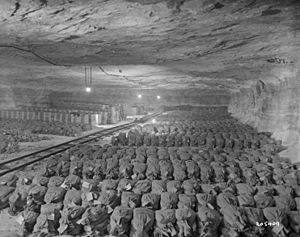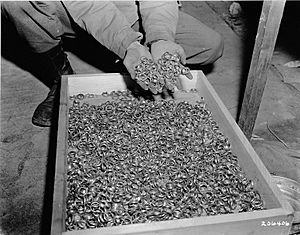Walther Funk facts for kids
Quick facts for kids
Walther Funk
|
|
|---|---|
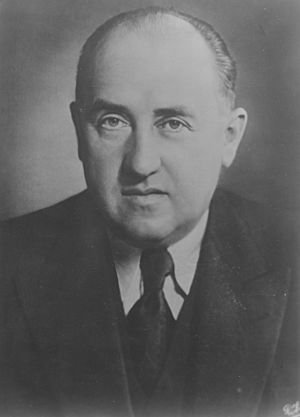
Funk in 1943
|
|
| Reichsminister of Economics | |
| In office 5 February 1938 – 2 May 1945 |
|
| President | Adolf Hitler (Führer) Karl Dönitz |
| Chancellor | Adolf Hitler Joseph Goebbels |
| Preceded by | Hermann Göring |
| Succeeded by | Position abolished |
| President of the Reichsbank | |
| In office 19 January 1939 – 8 May 1945 |
|
| Preceded by | Hjalmar Schacht |
| Succeeded by | Position abolished |
| Reich Press Chief and State Secretary in the Ministry of Public Enlightenment and Propaganda | |
| In office 13 March 1933 – 26 November 1937 |
|
| Appointed by | Adolf Hitler |
| Preceded by | Position established |
| Succeeded by | Otto Dietrich |
| Personal details | |
| Born | 18 August 1890 Danzkehmen, East Prussia, German Empire |
| Died | 31 May 1960 (aged 69) Düsseldorf, North Rhine-Westphalia, West Germany |
| Political party | Nazi Party |
| Spouse | Luise Schmidt-Sieben |
| Profession | Economist |
| Legal Judgment | |
| Criminal status | Deceased |
| Conviction(s) | Serious wrongdoing during the war Violations of international law |
| Trial | Nuremberg trials |
| Criminal penalty | Life imprisonment |
Walther Funk (born August 18, 1890 – died May 31, 1960) was a German economist and a high-ranking official in the Nazi Party. He held important jobs, like being the Minister for Economic Affairs for Germany from 1938 to 1945. He was also the head of the German central bank, the Reichsbank, from 1939 to 1945.
During his time in these roles, he helped prepare Germany's economy for war. After World War II ended, he was put on trial as a major war criminal at the Nuremberg Trials. He was found guilty and sentenced to prison for life. He stayed in prison until 1957 when he was released because he was very sick. He passed away three years later.
Contents
Early Life and Career
Walther Funk was born in 1890 in a town called Danzkehmen, which is now in Russia. His family owned a business. He was the only person tried at Nuremberg who was born in this part of Germany.
He went to the University of Berlin and the University of Leipzig to study law, economics, and philosophy. When World War I started, he joined the army. However, he got hurt and had to leave the army in 1916 because of his injuries.
After the war, he worked as a journalist. In 1924, he became the editor of a newspaper about money and business called the Berliner Börsenzeitung. In 1920, Funk married Luise Schmidt-Sieben.
Joining the Nazi Party
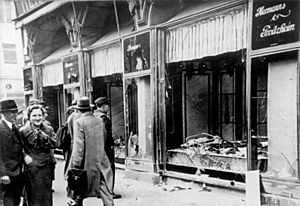
Walther Funk was a strong supporter of his country and was against certain political ideas. He left his newspaper job in 1931 and joined the Nazi Party. He became friends with Gregor Strasser, who helped him meet Adolf Hitler.
Because he was very interested in how the economy worked, he was chosen to be a member of the German parliament, called the Reichstag, in July 1932. In the Nazi Party, he became the leader of a group that planned how the country's money would be used.
After the Nazi Party took power, he left his parliament job. He was then made the Chief Press Officer for Germany. This job meant he had to make sure that nothing critical of Nazi policies was published. His boss was Joseph Goebbels.
Important Roles in Nazi Germany
In March 1933, Funk became a State Secretary in the Reich Ministry of Public Enlightenment and Propaganda. This ministry was in charge of controlling information and spreading Nazi ideas.
In 1936, when Hitler wanted to rebuild central Berlin, Funk suggested the new title for Albert Speer, who was in charge of the building plans.
On February 5, 1938, Funk took over as the Minister of Economics for Germany. He also became the General Plenipotentiary for Economics. He replaced Hjalmar Schacht, who had left his position. Schacht had been in a power struggle with Hermann Göring, who wanted more control over the economy.
From 1938 to 1939, Funk was also a director at the Bank of International Settlements, which is based in Switzerland. In January 1939, Hitler made Funk the President of the Reichsbank, Germany's central bank.
Funk noted that by 1938, the German government had taken Jewish property worth a lot of money. They used special rules to force German Jews to give their property and money to the state if they left the country.
Just before World War II began on August 30, Hitler appointed Funk to a special group of six ministers. This group was like a "war cabinet" to manage the country during the war.
Throughout the war, Funk attended many important meetings. He was involved in planning how to manage raw materials and workers for the war economy. He stayed in his job almost until the end of the Nazi government. Hitler even named him in his last will to continue as Minister for the Economy. Funk was arrested by American forces on May 11, 1945, and waited for his trial.
The Nuremberg Trials
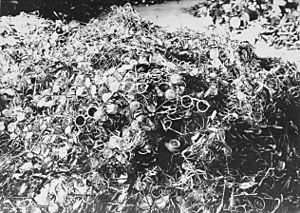
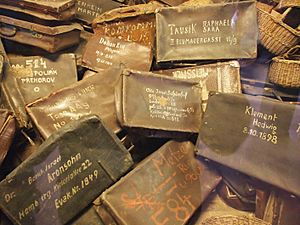
Walther Funk was put on trial with other Nazi leaders at the Nuremberg Trials. Prosecutors from the Allied countries said he was deeply involved in the government taking and selling the property of German Jews. They also accused him of planning and starting aggressive wars, and of serious wrongdoing during the war.
Funk argued that he had very little real power, even though he had important job titles. However, he did admit that he signed laws that took Jewish property. He said he felt "morally guilty" for this.
At the trials, the American Chief Prosecutor, Robert Jackson, called Funk "The Banker of Gold Teeth." This referred to the terrible practice of taking gold teeth from victims in Nazi camps. These teeth were sent to the Reichsbank to be melted down into gold bars. Many other gold items, like jewellery, eyeglasses, and finger rings, were also stolen from victims.
Other items taken from victims included their clothing, furniture, and artwork. Any money they had in stocks, shares, or businesses was also taken. Businesses were often sold for much less than they were worth. The money from selling these stolen items, like furniture, went to the Reichsbank for the Nazi government or the SS. Even the hair of victims was taken.
Funk seemed very upset during the trials. He cried when evidence was shown about the terrible things that happened in the Nazi camps. He needed medicine to sleep at night.
Hjalmar Schacht, who knew Funk well, thought Funk didn't fully understand how serious his jobs were. He also felt Funk didn't do well when he spoke in court. However, Albert Speer had a different view. He said Funk looked very tired but spoke skillfully in court.
Hermann Göring called Funk "an unimportant helper." But documents and a book about Funk's life during the war were used against him in court. This led to him being found guilty of several charges and sentenced to prison for life.
Funk was held in Spandau Prison with other high-ranking Nazis. He was released on May 16, 1957, because he was very sick. He visited Rudolf Hess, Albert Speer, and Baldur von Schirach before leaving the prison. He passed away three years later in Düsseldorf from diabetes.
Interests and Personality
Hjalmar Schacht said that Funk was "extraordinarily musical" and knew a lot about music. He preferred artistic and literary things in his life.
Once, at a dinner, Funk sat next to Schacht. When the orchestra played a song by Franz Lehár, Funk said, "Ah! Lehár – the Fuhrer is particularly fond of his music." Schacht joked, "It's a pity that Lehár is married to a Jewess." Funk immediately replied, "That's something the Fuhrer must not know on any account!"
Albert Speer also shared a story about Hitler playing a record of Liszt's Les Préludes for him. Hitler said, "This is going to be our victory fanfare for the Russian campaign. Funk chose it!"
See also
 In Spanish: Walther Funk para niños
In Spanish: Walther Funk para niños
- Auschwitz concentration camp
- Nazi plunder
- Oskar Groening
- Max Heiliger
Images for kids
-
During Kristallnacht in November 1938, a Jewish shop window was smashed.
-
eyeglasses from Auschwitz victims.
-
luggage taken from Auschwitz victims.
 | Aaron Henry |
 | T. R. M. Howard |
 | Jesse Jackson |


